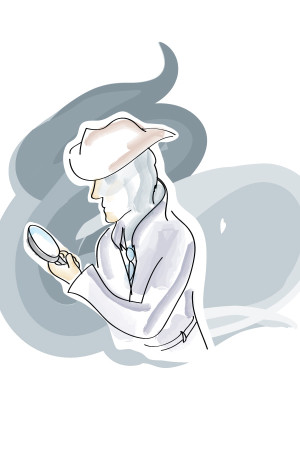Surveilling US government’s approach to private data
March 2, 2014
Starting with an article by Glenn Greenwald in “The Guardian,” it has come to the attention of the United States, and the world, of a scandal by the National Security Agency (NSA) on surveillance. This initial report revealed how much the NSA was monitoring phone calls of Americans and a court order that asked Verizon to turn over domestic phone records to the government. This may seem scary, but what may seem even more frightening is that citizens may not be fully informed on the subject.
Phone Monitoring
The court order only demanded “metadata,” or information such as who was called, how long the call lasted, and when they called. The government is not actually listening in on phone calls, but collecting information on the calls. Therefore, it is not possible that the NSA is listening in on the nation’s conversations, but this assertion stands unproven. The NSA can also get a rough idea of locations of callers by seeing which phone towers the calls were sent to.
The legality of this is vague, since not every detail is known, but many argue that the government is overstepping their boundaries of power. The Patriot Act allows the government to collect business data for anti-terrorism purposes. However, people argue that the government should have requested specific data related to a terrorism issue, not the call data of everyone.
The Third Amendment does not protect against this act of the government. Technically, the government does not need a warrant to search information when the information is given up to a third party, like a phone company.
NSA Internet Monitoring
The NSA was also reported to have been monitoring online activity. A program named “Prism” allowed the NSA to collect search history, content of e-mails, file transfers, and live chats. There are claims that the companies allow this to happen. However, when contacted, these claims were denied. Google stated, “Google cares deeply about the security of our users’ data. We disclose user data to government in accordance with the law, and we review all such requests carefully. From time to time, people allege that we have created a government ‘back door’ into our systems, but Google does not have a back door for the government to access private user data.”
This monitoring covers several major internet providers such as Facebook, Youtube, Skype, and Apple. Microsoft is also a member, and the NSA was even reported to have been monitoring Microsoft”s online Xbox live service. The access to this information was first given under law changes with President Bush, and then renewed with President Obama in 2012.
Some students are not alarmed. “I feel like I don’t really care if they see any of my stuff. What are they going to do, yell at me for taking selfies?” junior Charlotte Molali said.
Others feel differently. “I don’t feel very good that the government is spying on me,” sophomore Hayden Dolpi said. Additionally, senior Connor Reeves said, “I think its not right. We have our rights.”
According to an anonymous Department of Defense (DOD) worker, “The NSA, CIA, and all the intelligence agencies cannot listen to, or otherwise snoop on US citizens without a court order. Based on what I know about how [the NSA] monitors, I am comfortable with [NSA] having the mission they have. Since 9/11 there has been the prevention of several terrorist attacks by the government listening to communications such as phone conversations.” However, “unless there is reason such as ties to terrorism, we should be able to expect that our communications are free from government monitoring,” he said.
Snowden
Much of the information about government spying was revealed by Edward Snowden. Snowden downloaded 1.7 million data files from the US government while working at an NSA facility in Hawaii. He then revealed this information to journalistic sources such as “The Guardian,” who spread the information to the general public.
The DOD worker said, “in Snowden’s case, I don’t think he knew what he was doing. He has certainly caused many problems that will eventually cost the lives of US military personnel. Some whistleblowers have legitimate reasons to sound the alarm, he is not one of them.”
So how much do students actually know about what the government is doing? According to a survey conducted by The Patriot, 75.9 percent of students believe that the US Federal government is able to spy on private data of US citizens without a warrant, which is correct. 59.5 percent of students believe the US government is allowed to set up wire taps, in order to listen to phone conversations, and access their computers and other devices; however, this is false. Only 37.8 percent of students correctly said that The Patriot Act was the act which allowed the US government to collect information about its citizens.
According to sophomore Max Butschky, he is roughly educated on the issues. “It is an invasion of privacy,” Butschky said. “I think [whistleblowers] are justified, even if it is illegal. People deserve to know.”
For more, click here to see the pro argument and the con argument on the morality of the recent acts of Edward Snowden.
Cole Alban is the Online Chief and Justin Hawkins is an Opinion Editor for The Patriot and jcpatriot.com.

